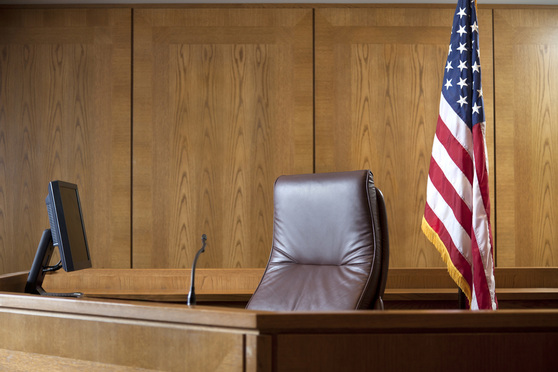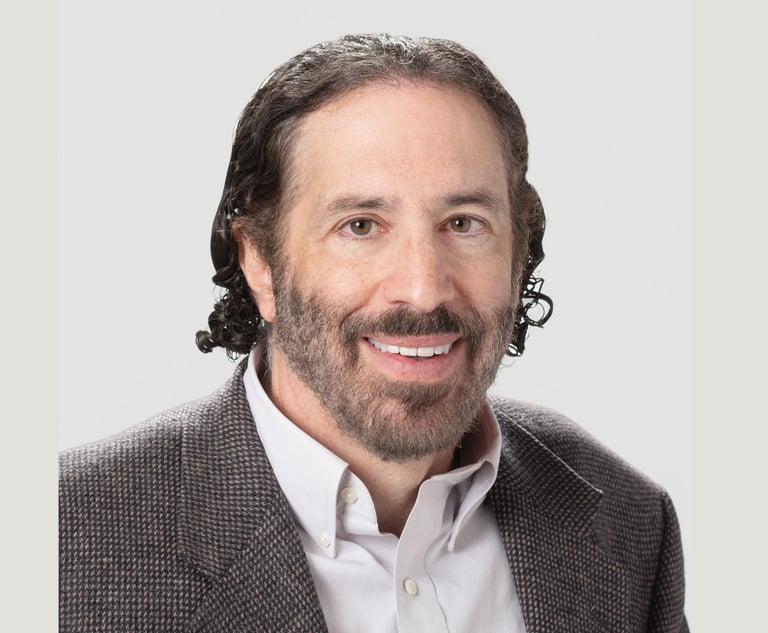Justice Refuses to Step Down From Statutory Damages Cap Fight
The opinion marked the second time this year Justice David Wecht has denied a recusal request based on comments he made during his 2015 campaign.
August 16, 2018 at 03:27 PM
6 minute read

Statements made during the campaign trail about a similar, but unrelated case do not warrant recusal, a Pennsylvania Supreme Court justice said in declining to step away from a pair of cases pending before the high court that challenge the statutory damages cap for state agencies.
Justice David N. Wecht on Aug. 14 issued an opinion and order refusing to recuse from the cases Freilich v. Southeastern Pennsylvania Transportation Agency and Schaller v. New Flyer of America after the transportation agency argued that Wecht's 2015 comments about a similar case merited his recusal. The opinion marked the second time this year Wecht has denied a recusal request based on comments he made during his 2015 campaign.
In the cases currently pending before the court, the Southeastern Pennsylvania Transportation Agency argued that Wecht's criticism of the Supreme Court's 2014 decision in Zauflik v. Pennsbury School District means he should step away from Freilich and Schaller as the court considers whether to take up the appeals.
The plaintiff in Zauflik had sought to overturn the statutory damages cap against municipalities and schools under the governmental immunity statute, while Freilich and Schaller are challenging similar damages caps outlined under sovereign immunity, which deals with state agencies. The court in Zauflik ultimately denied the challenge, and said that only the legislature could overturn the statutory damages cap.
In his three-page opinion rejecting the recusal request, Wecht said SEPTA mischaracterized his comments as indicating that he would have ruled differently in Zauflik, and further said his comments did not indicate that he had already made up his mind about the pending appeals.
“Criticizing a prior decision is a far cry from committing to its reversal. Discussing and debating the law is what jurists do. Any scrupulous judge must counterbalance his own inclination on a given legal question with the paramount obligation to honor prior precedent,” Wecht said. “Stare decisis, and the stability in the law that it promotes, is a pillar of our common-law system. That an honorable jurist speaks critically of prior precedent should not by itself prompt anyone to assume that he will disdain it.”
The words echoed similar statements Wecht made in February in the closely watched dispute over whether Pennsylvania's congressional map was unconstitutionally gerrymandered. In that case, League of Women Voters of Pennsylvania v. Commonwealth of Pennsylvania, Wecht rejected a similar call for disqualification from Republican legislative leaders, who had also cited statements Wecht made while campaigning. In declining that request, Wecht also said the recusal request mischaracterized his statements, and nothing he said indicated how he might rule.
“These comments expressed my thoughts on the topic, something manifestly distinct from a clear commitment to rule in a certain way if presented with a specific challenge based upon a well-developed factual record and the benefit of full and fair advocacy,” Wecht said in a 20-page opinion issued Feb. 5.
Duquesne University School of Law professor Bruce Ledewitz said the comments seemed to be fair under the U.S. Supreme Court's 2002 ruling in Republican Party of Minnesota v. White, which Wecht also cited in his opinions. That ruling struck down a law that forbade judicial candidates from outlining their views about disputed issues.
Ledewitz said it likely would be problematic for a candidate to say that a specific party would lose their case if that candidate was elected, but he noted that courts have not yet explicitly decided where the line is in terms of what a judicial candidate can and cannot say.
“It will have to go directly to the party, not the issue,” he said, predicting where he thinks the line may eventually be drawn.
Ledewitz also said Pennsylvanians are likely to see more of these recusal motions because of the attention that was given to the 2015 judicial campaign.
That judicial race was historic for several reasons. Not only did the candidates raise a record amount of money, but the court was also operating under a severe ethical cloud. The high court was reeling from a scandal at the time that eventually led to the ouster of two justices for sending lewd and pornographic emails. A few years before that, another justice was convicted of political corruption.
The candidates, Ledewitz said, faced tough questions and more scrutiny than what candidates typically faced in prior elections.
“I think that campaign in 2015 was a good one,” Ledewitz said. “All of the candidates were talking about problems and the facts that needed to be addressed, and the voters got a very good understanding of the judges. But if, fundamentally, that's an issue, then you shouldn't elect judges.”
Maida Milone, executive director of the judicial reform group Pennsylvanians for Modern Courts, which advocates for merit selection of judges, said she doubts the courts will likely see more recusal motions, and said the requests Wecht has received may lead other candidates to be more cautious.
Milone noted that one of the canons regarding judicial conduct bars judges from making statements that would “reasonably be expected to affect the outcome or impair the fairness of a matter pending or impending in any court.”
“It's a tightrope they have to walk. From a PMC perspective, I would rather they be in the position that they not have to walk that tightrope,” Milone said. “If they have merit selection, we won't be worried about the campaign trail.”
Kline & Specter attorney Thomas R. Kline, who is representing the plaintiffs in Freilich and Schaller, and who represented the plaintiff in Zauflik, said in an emailed statement he is glad Wecht will consider the appeals.
“We are pleased to see that Justice Wecht will participate in consideration of the petition and hopeful that the court will take up this issue of paramount importance again,” Kline said. “We are strongly convinced that the overwhelming considerations and equities, despite prior rulings, are on the side of two terribly injured victims in two separate separate accidents whose claims are eviscerated if the draconian cap which is unjust and unconstitutional is allowed to stand.”
Mark Gottlieb of Offit Kurman, who is representing SEPTA, did not return a call seeking comment.
This content has been archived. It is available through our partners, LexisNexis® and Bloomberg Law.
To view this content, please continue to their sites.
Not a Lexis Subscriber?
Subscribe Now
Not a Bloomberg Law Subscriber?
Subscribe Now
NOT FOR REPRINT
© 2025 ALM Global, LLC, All Rights Reserved. Request academic re-use from www.copyright.com. All other uses, submit a request to [email protected]. For more information visit Asset & Logo Licensing.
You Might Like
View All
Lackawanna County Lawyer Fails to Shake Legal Mal Claims Over Sex With Client
3 minute read
Pa. Superior Court Rules Pizza Chain Liable for Franchisee Driver's Crash
4 minute read
Patent Pending ... and Pending ... and Pending? Brace Yourself for Longer Waits
3 minute read
Boosting Litigation and Employee Benefits Practices, Two Am Law 100 Firms Grow in Pittsburgh
3 minute readTrending Stories
Who Got The Work
J. Brugh Lower of Gibbons has entered an appearance for industrial equipment supplier Devco Corporation in a pending trademark infringement lawsuit. The suit, accusing the defendant of selling knock-off Graco products, was filed Dec. 18 in New Jersey District Court by Rivkin Radler on behalf of Graco Inc. and Graco Minnesota. The case, assigned to U.S. District Judge Zahid N. Quraishi, is 3:24-cv-11294, Graco Inc. et al v. Devco Corporation.
Who Got The Work
Rebecca Maller-Stein and Kent A. Yalowitz of Arnold & Porter Kaye Scholer have entered their appearances for Hanaco Venture Capital and its executives, Lior Prosor and David Frankel, in a pending securities lawsuit. The action, filed on Dec. 24 in New York Southern District Court by Zell, Aron & Co. on behalf of Goldeneye Advisors, accuses the defendants of negligently and fraudulently managing the plaintiff's $1 million investment. The case, assigned to U.S. District Judge Vernon S. Broderick, is 1:24-cv-09918, Goldeneye Advisors, LLC v. Hanaco Venture Capital, Ltd. et al.
Who Got The Work
Attorneys from A&O Shearman has stepped in as defense counsel for Toronto-Dominion Bank and other defendants in a pending securities class action. The suit, filed Dec. 11 in New York Southern District Court by Bleichmar Fonti & Auld, accuses the defendants of concealing the bank's 'pervasive' deficiencies in regards to its compliance with the Bank Secrecy Act and the quality of its anti-money laundering controls. The case, assigned to U.S. District Judge Arun Subramanian, is 1:24-cv-09445, Gonzalez v. The Toronto-Dominion Bank et al.
Who Got The Work
Crown Castle International, a Pennsylvania company providing shared communications infrastructure, has turned to Luke D. Wolf of Gordon Rees Scully Mansukhani to fend off a pending breach-of-contract lawsuit. The court action, filed Nov. 25 in Michigan Eastern District Court by Hooper Hathaway PC on behalf of The Town Residences LLC, accuses Crown Castle of failing to transfer approximately $30,000 in utility payments from T-Mobile in breach of a roof-top lease and assignment agreement. The case, assigned to U.S. District Judge Susan K. Declercq, is 2:24-cv-13131, The Town Residences LLC v. T-Mobile US, Inc. et al.
Who Got The Work
Wilfred P. Coronato and Daniel M. Schwartz of McCarter & English have stepped in as defense counsel to Electrolux Home Products Inc. in a pending product liability lawsuit. The court action, filed Nov. 26 in New York Eastern District Court by Poulos Lopiccolo PC and Nagel Rice LLP on behalf of David Stern, alleges that the defendant's refrigerators’ drawers and shelving repeatedly break and fall apart within months after purchase. The case, assigned to U.S. District Judge Joan M. Azrack, is 2:24-cv-08204, Stern v. Electrolux Home Products, Inc.
Featured Firms
Law Offices of Gary Martin Hays & Associates, P.C.
(470) 294-1674
Law Offices of Mark E. Salomone
(857) 444-6468
Smith & Hassler
(713) 739-1250





